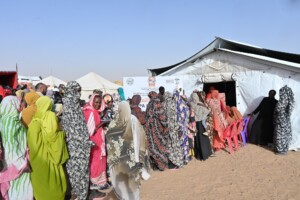Sudan airlines raise domestic ticket prices; hyperinflation expected
Airline companies in Sudan have announced an increase in domestic flight prices by more than 20 per cent by August 6. Economists fear hyperinflation in the near future.
 An aircraft of Badr Airlines, a private airline based in Khartoum (ch-aviation.com)
An aircraft of Badr Airlines, a private airline based in Khartoum (ch-aviation.com)
Airline companies in Sudan have announced an increase in domestic flight prices by more than 20 per cent by August 6. Economists fear hyperinflation in the near future.
The airlines pointed to an increase of 23 per cent, caused by the rising fuel prices since end December, and the indicative US dollar rate which the Bank of Sudan raised twice this year.
Economic analyst and former banker Hafiz Ismail confirmed that the ticket price increase is linked to the rapidly dropping value of the Sudanese Pound.
“The shortage of hard currency is pushing the Dollar rates against the Sudanese Pound on the parallel market to unprecedented levels,” he told Radio Dabanga. “This makes business quite unprofitable for airlines, as they have to cover the expenses of fuel, spare parts, and other operating costs in hard currency.”
The economist expects that many international companies may reduce their flights to Khartoum in the future because of the continuing fall of the Pound and the rapid increase in ticket prices.
According to the announced increases, the price of a flight from Khartoum to for instance El Geneina in West Darfur will cost SDG 3,290 ($ 181*), compared to SDG 2,450 ($ 135) in December.
‘No stabilisation’
“As long as Khartoum does not take any serious measures to remedy the economic crisis in the country, I do not see any possibility for the stabilisation of the Sudanese Pound rate at the moment,” Ismail explained.
He warned that Sudan may soon enter the stage of hyperinflation.
“In the past, the government used to resort to temporary solutions by obtaining cash reserves from friendly countries, which is not possible any more. Borrowing is also out of the question because Sudan's credit page is far from clean,” he said. “In addition, productive sectors such as agriculture and industry are suffering from fuel shortages, which makes it very hard to produce enough for the export which brings in hard currency.”
According to the former banker, the economic malaise is a reflection of the political crisis in the country. “The economy cannot be cured without comprehensive political reforms.”
He said that the Sudanese have become paralysed. “People do not have enough money to meet their simple needs such as sufficient meals, rent, or medical treatment, as the money and stocks are located abroad. They are now focussed on surviving only.”
The inflation rate rose to 63,86 per cent in June. Following new increases in the prices of food and other basic consumer goods in Sudan in mid-July, economic analysts began to warn for an imminent economic collapse.
Austerity measures
End 2017, the Sudanese government decided on a package of austerity measures in an attempt to address the huge gap in its finances. Its priorities did not change: more than 70 per cent of its spending is still allocated to the defence and security sectors, less than 10 per cent will be spent on health and education.
The custom duties were raised by more than 200 per cent – which immediately affected the prices of most of the goods in early January. The government further decided to liberalise the flour market which lead to the doubling of the bread prices.
The indicative exchange rate of the Sudanese Pound against the US Dollar was devalued twice, in early January from nearly SDG 7 to SGD 18, and in early February to nearly SDG 30. Yet, the US Dollar rate in the parallel forex market which settled at SDG 30 in January began to rise again in February, and reached SDG 46 in mid-July.
Due to the combination of major tax increases and the fall of the Sudanese currency value, prices of locally produced commodities like meat, milk, and vegetables are now increasing continuously.
* Based on the indicative US Dollar rate quoted by the Central Bank of Sudan (CBoS











 and then
and then